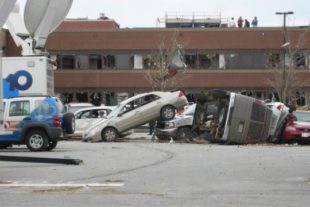
When smoke from wildfires drifted dangerously close to a southeast Georgia nursing home last week, Liberty Regional Medical Center launched an emergency evacuation.
The more than 100 residents in a Ludowici nursing home were brought to a nearby church. “The evacuation went very smoothly,’’ said Sam Johnson, an executive at Liberty Regional in Hinesville, which owns the nursing home. Residents safely returned to the nursing home two days later.
Hospitals continually prepare and train for such evacuations – and for more calamitous, mass-casualty events.
The ongoing nuclear crisis in Japan has prompted health concerns far away from that disaster. People in America have snapped up potassium iodide and other supplements to prevent health effects, and trace amounts of the radiation have drifted into the Southeast.
At the same time, Japan’s nuclear disaster, on top of a tsunami and major earthquake, has sparked public interest in how ready the U.S. – and Georgia – are for a full-scale emergency.
Health officials in Georgia say the state’s emergency preparedness has improved significantly since the September 2001 terror attacks and subsequent anthrax scare.
“There are hundreds of people in the state who are now trained in mass casualty management,’’ says Cham Dallas, director of the Institute for Health Management and Mass Destruction Defense at the University of Georgia.
“It has taken us 10 years to get there,’’ Dallas says. “We have to continue to work on it.’’
An emergency scorecard
Last year, Georgia rated in the middle of the pack among states on emergency health preparedness, achieving a 7 out of 10 score.
The state scored well on health information technology, electronic surveillance, incident response and emergency operations center, in the 2010 report from the Trust for America’s Health and the Robert Wood Johnson Foundation.
Georgia was graded down for cutting its overall public health spending, as well as on child care facility readiness and detection of foodborne disease.
Despite the events in Japan, neither Dallas nor Dr. Patrick O’Neal, emergency preparedness director at the Georgia Division of Public Health, has major concerns about potential safety problems with Georgia’s nuclear reactors.
The safety record of the nuclear facilities in Georgia is very good, says Dallas, who has studied the Chernobyl disaster.
Georgia Power, the operator of the state’s two nuclear facilities, says both are safe and are built to withstand a natural disaster like the one in Japan.
The state, though, has a history of major weather events. Part of Georgia’s ability to respond to emergencies comes from that long experience with natural events such as tornadoes, floods, wildfires and hurricanes, says O’Neal, who is director of the Section of Emergency Preparedness and Response for state Public Health.
Four years ago, for example, a tornado ripped through a hospital in Americus, as well as other parts of the South Georgia town. Patients were evacuated to other hospitals, and an emergency field hospital was deployed.
Since then, “the state has purchased several field hospitals,’’ says Adrianne Feinberg, project manager of emergency preparedness and response for the Georgia Hospital Association.
Hospitals conduct emergency exercises at least twice a year. And Georgia has established a system where hospitals in a region coordinate with each other in case of an emergency, Feinberg says.
Each Public Health district in Georgia has a risk communicator to help reach out to people in multiple languages, in the event of a disaster, O’Neal says.
Hurricane evacuation
No Category 4 or 5 hurricane has struck the coast of Georgia, O’Neal says, though the state has experienced such a storm indirectly, through evacuations after Hurricanes Katrina and Rita.
“There is nothing protective about the coast of Georgia,’’ Dallas says. “It’s only a matter of time.’’
He says that though evacuation routes are limited, ‘’the health care people on the coast are doing exercises all the time.’’
O’Neal says Georgia is “reasonably well prepared’’ for a big hurricane. The state is working to identify additional evacuation sites away from the coast, he adds.
The recent ice storm in Atlanta and North Georgia caused problems for area hospitals.
“Patients weren’t able to be discharged, supplies weren’t delivered,’’ Feinberg says. Some hospitals ran very low on food, laundry and medical supplies, she says.
Even facilities in South Georgia were threatened, because the supply chain was disrupted.
Pandemic concerns
Like a major hurricane, a major pandemic disease is likely to strike at some point, health officials say.
Two years ago, the H1N1 flu outbreak showed the state’s ability to mass dispense antiviral drugs and to conduct a mass vaccination campaign, O’Neal says.
“I feel that when a really bad pandemic strikes,’’ he says, “Georgia will be in a really good position to respond.’’
During such an outbreak, nongovernmental organizations such as churches, the Red Cross and United Way play a role, he says.
“Government can’t do it all,’’ O’Neal says. “We do have responsibilities, and we are up to those responsibilities,’’ he says.
But in the case of a pandemic, family members themselves may have to assist patients in hospitals if the ranks of nurses and doctors are stretched thin, O’Neal says.

